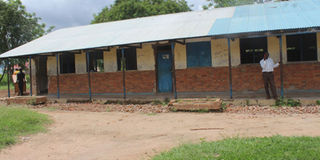Oyam school fails to get first grade in 35 years

Challenged. A teacher makes a call outside the dilapidated classroom block at Ototong Primary School, which has spent 35years without a first grade in the Primary Living Examinations. PHOTO BY BILL OKETCH
What you need to know:
Warning. Ms Betty Okullo, councillor for Abok and Ngai sub-counties, says any school that fails to produce first grade this year would not be considered for government projects.
A school in Oyam District has been in existence for the last 35 years and has never had a single first grade in the Primary Living Examinations (PLE), Daily Monitor has learnt.
Ototong Primary School suffers different challenges.
Despite various reforms introduced by the government in the education sector, up-country schools have continued to score poor grades.
Pupils’ automatic promotion, parents’ negative attitude, teachers’ laxity, inadequate textbooks and desks, inadequate teachers, lack of parents’ involvement and participation in supporting the schools have been blamed for the poor academic performance.
Co-curricular activities such as games and sports are said not to be complementing learning as there are no facilities at Ototong Primary School in Abok Sub-county.
The head teacher of Ototong Primary School, Mr Tommy Arach, said he will closely monitor his teachers’ performance.
He also said he would ensure that teachers follow their professional codes of conduct.
According to a community scorecard administered by the Apac Anti-Corruption Coalition (TAACC), a non-governmental organisation, released in March, the unprofessional conduct of teachers has also contributed to the poor academic performance.
TAACC found that unethical conduct of some teachers, including drinking alcohol during working hours, laxity and inability to complete syllabuses and prepare lesson plans had affected learning.
The study indicated that learners’ assessments by the teachers are not satisfactory. There are also only 10 stances of pit-latrines serving a population of 773 pupils enrolled at Ototong.
Because of inadequate staff accommodations, the school head teacher commutes from Ngai Sub-county, about nine kilometres away.
The community scorecard further revealed that of the 13 teachers at Ototong, only eight have houses.
However, the challenges affecting Ototong cut across the entire 109 government-aided primary schools in Oyam.
The district has over the years been registering low numbers of pupils passing in Division One but with the increase in number of private schools, the district last year got 3.6 per cent in Division One. For instance, first grade was last registered at Ogwet Primary School in Ngai Sub-county in 2013.
“In 2018, pupils did not sit PLE exams whereas internal exams are passed with very low marks thus automatic promotion taking shape,” the scorecard added. At this school, pupils in lower primary sit on the floor.
At Abang Primary School in Myene Sub-county, only 11 teachers are teaching a total of 824 learners.
The community scorecard also noted that lack of accountability of school funds was demoralising parents from contributing more to school development.
However, the district leadership has warned that schools that continue to perform poorly in PLE risk missing out on government projects.
Ms Betty Okullo, councillor for Abok and Ngai sub-counties, says any school that fails to produce first grade this year would not be considered for the support.
Oyam, like several districts in northern Uganda, has been surviving mainly on funds under Peace Recovery and Development Plan and Northern Uganda Social Action Fund for the implementation of its educational activities.
Former district education officer Norman Okello says the projects have contributed to the improvement in PLE performance at Minakulu, Ayomapwono, Anyeke, Ngai, Anyomolyec, Otwal, Ogwet, Onekgwok and Agobadong primary schools. “Other benefits that we have got from teachers’ houses is that it has made teachers to be nearer the schools. So it has increased on teacher-pupil contact hours,” he says.
The study
Why the tool was used. The social accountability tool or community scorecard was administered to generate issues affecting service delivery in the three government schools.
This followed reports by locally trained members of the community called the Independent Budget Monitors (IBMS) that the three schools were limping because of the challenges they are facing.
The ultimate goal was to see that service delivery is improved.
Methodology. Issues were generated from the service providers, service seekers and leaders responsible for effective service delivery. Parents, pupils, teachers and leaders were divided into different groups. Each group identified the gaps.
Action plans were later developed while issues that could be solved at the service points by stakeholders were highlighted and action taken. Issues that needed the attention of higher authorities were documented and presented to them with the aim of improving service delivery.
Credibility. It is a tested social accountability tool used by development practitioners in the form of an “action research”. It is participatory, non-confrontational and generates evidence.
Recommendations
The scorecard recommends that the head teachers and the sub-county leaders should step up monitoring of teachers’ performance and sharing the performance report with the district in time.
It also recommends that Parents-Teachers Association should mobilise parents to construct more staff houses.
Oyam DEO Francis Oleke Ocero says many schools have been performing poorly because of the role conflict involving head teachers and the Parent-Teacher Association (PTA) but it was solved.
He says a committee has been set up to handle teachers’ misconduct and new PTA members were recruited.




